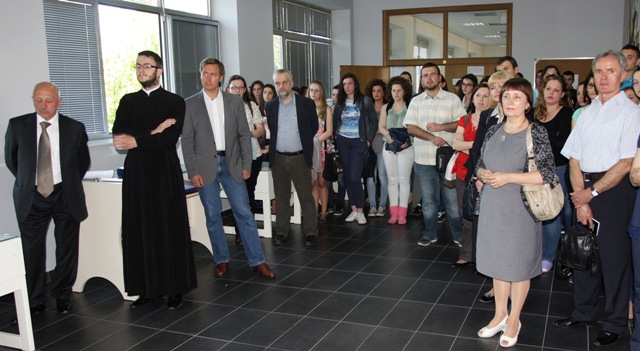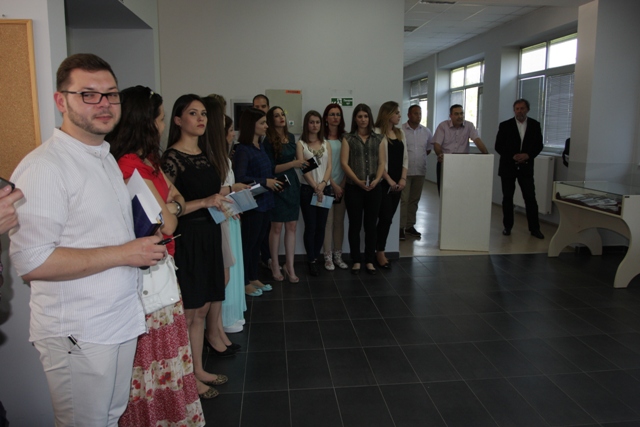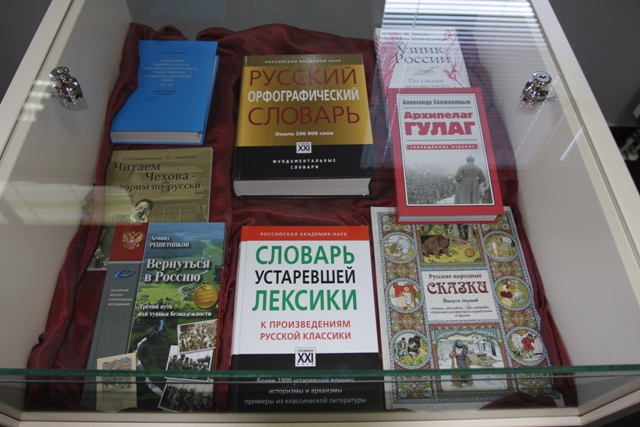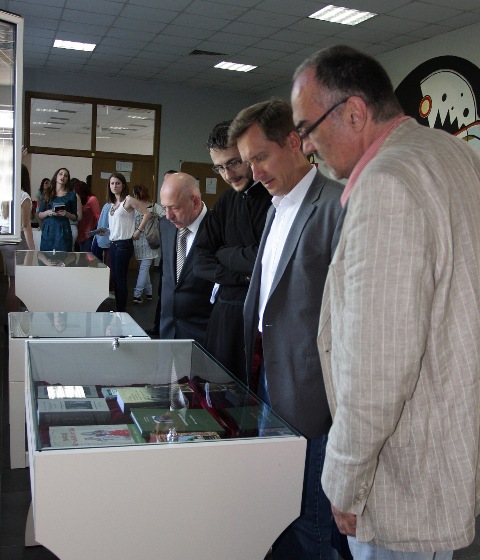The exhibition of books donated by Alexander Solzhenitsyn Foundation and the lecture delivered by writer Alexei Varlamov at the Faculty of Philology
University of Banja LukaGeneralOn 4 June 2014, at the Faculty of Philology of the University of Banja Luka, the exhibition of books donated by the Home of Russian foundation, named after well-known Russian Nobel Laureate and the most famous dissident of the Soviet era, Alexander Solzhenitsyn, was opened.
Three hundred valuable publications on Russian history, historical and cultural heritage of Russian emigration, philosophy, Russian language, theology, art and fiction have been published by the ‘Ruski put’ publishing house, which is a part of the Home of Russian foundation.
‘The donated books are a huge contribution to studying Russian language and literature at the department of the same name at the Faculty of Philology”, said the Dean of the Faculty, Prof. Mladenko Sadzak, and pointed out that they carried a deeper meaning: ‘Not only do they represent the Russian people, their love of knowledge and cognition, and the ‘Alexander Solzhenitsyn’ Foundation, but they also represent us who received this present with joy and gratitude, as well as the doubtless connection between our two peoples and the support we received from Russia even when all the others were against us’.
Prof. Dusko Pevulja, Head of the Department for Russian Language and Literature at the Faculty of Philology, pointed out that there were 80 students studying at this Department, and that, despite being the youngest, this Department was slowly but definitely becoming one of the most dynamic departments at the Faculty. ‘Students from all departments of our Faculty are expected to reach beyond mere studying language and literature, to become the sources of ideas for various activities that include linking of our culture with the cultures of the peoples whose languages we study. We were lucky to witness these expectations being met when it comes to the Department of Russian Language and Literature’, said Prof. Pevulja .
These words were confirmed through the programme performed by sophomore students of Russian language and literature: 14 members of the translator workshop read the fragments from 14 short stories by Alexander Solzhenitsyn they translated themselves. These translations, as translator and writer Zoran Kostic, explained, had just been published by the Faculty of Philology in the book called Mrvice (Crumbs). ‘Solzhenitsyn was the master of communicating great truths in a nutshell, and this translation is the proof that our translators really managed to accomplish this as well’, Kostic said.
After that, the representative of the Home of Russian foundation ‘Alexander Solzhenitsyn’, Ms. Tatyana Irinarhova, presented the organization, and then the audience had the opportunity to see the film dealing with the same topic.
By reminding the present of the fact that the Home had been established in 1995 with the aim of preserving the cultural heritage of the Russian emigration and helping the organizations that study Russian culture abroad, Ms. Irinarhova pointed out that 19 years was not a long period, neither in one’s life nor in terms of an organization, but in that period the Home had managed to do many good things. “Our organization is unique in its own way, not only in Russia, but also abroad. We function as a library, museum, archives, centre for scientific research and culture centre. We have our own publisher , the ‘Ruski put’, film club and production company of the same name”, the representative of the Home pointed out. She also mentioned that, since it had been established, the Home had been donating books and organizing exhibitions of the donated publications at Russian departments at numerous faculties in Russia and abroad. ‘This is one of the main goals of our work. We cover enormous area, from Russia, Baltic area, European cities, to South America and Asia. Each year we donate over 30 000 books’, Ms. Irinarhova said.
She pointed out that she was pleased with the fact that, apart from the representatives of the Home, the faculties that receive the book donations are also regularly visited by the ‘Alexander Solzhenitsyn’ prize winners, which contributes to a great extent to introducing not only the literary oeuvre of Nobel laureate Solzhenitsyn and the activities of the Foundation, but also the Russian literature and culture in general to people all over the world.
The opportunity to learn more on the aforementioned was given to the students and professors of the Faculty of Philology and other faculties of the University of Banja Luka during the lecture of a famous Russian writer and professor at the Moscow State University, Mr. Alexei Varlamov, an ‘Alexander Solzhenitsyn’ prize winner. Since the greater part of his oeuvre is related to researching into and writing biographies of the most famous Russian writers of the 20th century, the title of his lecture at the Faculty of Philology was “Notes on biography”. Through this lecture, Mr. Varlamov, as he pointed out himself, wanted to show the importance of biographies of the great writers and poets and how much they reflect the present reality.
The author of biographies of many Russian writers such as Tolstoy, Bulgakov and Grin, Varlamov pointed out that, while dealing with literary biography, he had often come across some unexpected cognitions, and had always been interested to find out how the writers, who were born in one system, survived the Revolution and the Civil War, and then were forced to live in a completely different system, had managed to cope with that. ‘Many of them did not succeed. That is why the destiny of the Russian writers of the 20th century is a tragic one. They were either killed or imprisoned, were not allowed to publish their books, so many of them became famous only posthumously. Solzhenitsyn was one of those who succeeded. He beat that system”, said Mr. Varlamov .
He explained that the main reason why Solzhenitsyn fought against communism and the USSR was his great love for Russia. ‘Unlike many Russian emigrants of the so-called third wave, to whom Russia and the USSR were the same, so they ended up hating Russia from the past by hating the USSR, Solzhenitsyn observed the terms ‘Russian’ and ‘Soviet citizen’ as antonyms. When the West realized this, they were not so benevolent toward him. Solzhenitsyn confirmed his conviction by not supporting Yeltsin after returning to Russia”, said Mr. Varlamov. He concluded that not only Russia, but also the rest of the world, miss Solzhenitsyn not only as a writer, but also as somebody who chronicled and commented on social affairs.


